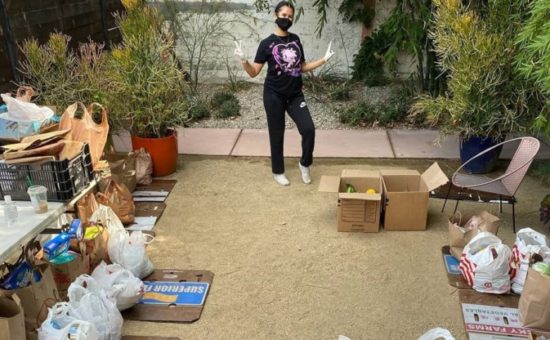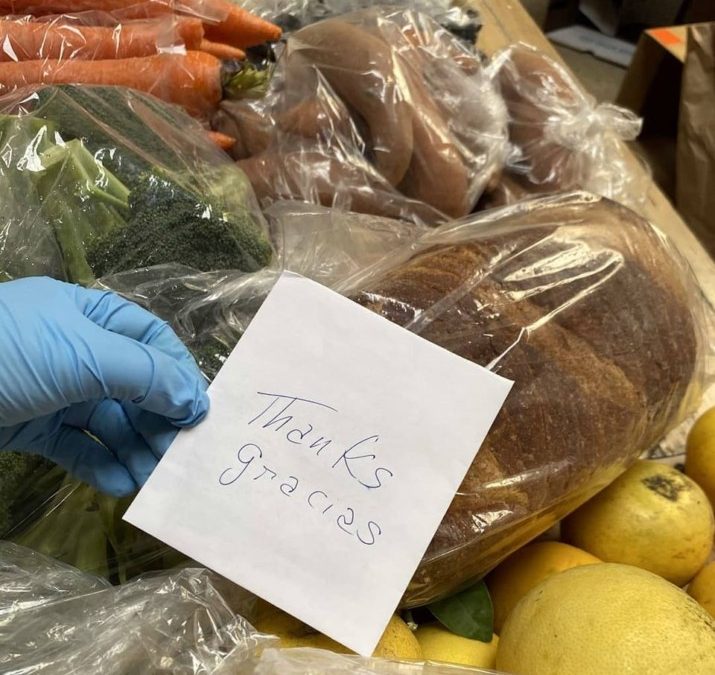Los Angeles, CA. LA Más consists of a small team that made a huge impact with the neighborhood of Northeast LA (NELA) through a food support program (seen above), partnerships with other organizations, and continuous communication with residents.
The non-profit is organized by a group of seven people who prioritize promoting projects that help to elevate working-class communities and people of color since its foundation in 2012.
Program Manager Alexandra Ramirez explained that “before COVID-19, we had two major programs” that the team primarily focused on. The Backyard Homes Project allowed homeowners to construct an Accessory Dwelling Unit (ADU) in exchange for providing affordable housing to a Section 8 voucher, and Storefronts, LA which focused on “developing storefronts redesigned for small business owners.”
The ADU project and Storefronts, LA regularly had in-person meetings with multiple people, which could not continue as phase one of quarantine began in mid-March. “We were in the midst of doing about three or four designs,” said Ramirez, “so that had to stop.”
For the next two weeks, Ramirez and her team started checking in and getting advice from local non-profits about how to best serve the community during the shutdown. It was in these conversations that LA Más and its local partners started to note “this informal phone tree that was happening” between residents of NELA checking in with their neighbors about how they could help during the pandemic.
“And that’s when we started realizing that we could do more of those check-ins,” said Ramirez, “we didn’t know how much more we could do so we really needed to rely on our volunteers.” (seen below)
An Excel spreadsheet was created by the LA Más team and was made up of the contact information of about two thousand residents. They began contacting people on their spreadsheet in order to best understand their current needs.
“We knew that we couldn’t be the only ones making these calls and checking in with residents and that’s when we opened it up to our volunteers,” Ramirez said, “and we started training them to make calls and, yeah, we went on from there.”
After about a week of over 150 volunteers talking to residents, LA Más found that the highest needs were primarily with food and information on financial and social issues that arose during the pandemic.

Grocery sponsorship allows struggling families to be able to eat fresh food through deliveries made by LA Más volunteers. Photo credit: LA Más Outreach Lead Liliana Sánchez
In mid-April, the Northeast LA Community Response was announced on LA Más’s social media pages as an initiative to help community members gain immediate relief. Requests could range from deliveries of activity kits and face masks to information on unemployment filings and mortgage payments.
The program officially concluded in June, but LA Más was not going to simply stop helping the community.
“We kept seeing how food insecurity really was so present in our community, so we have been running offshoots of that program [NE LA Community Response] ever since,” Ramirez explained.
For the rest of the summer, LA Más operated a temporary food support program, where volunteers delivered donated and sponsored grocery bags for families in need on a weekly basis.
When discussing what Ramirez hopes for in the future when the coronavirus may not be as much of a centralized issue, she said, “We really need to address the systemic issues that are impacting working-class communities of color in our neighborhood.” She continues to explain immigrant families in particular “had a really hard time getting the support they needed.”
“Really, our goal is to continue to work in addressing those underlying issues, and figuring out how do we support our community and make these issues more visible,” Ramirez concluded.
LA Más is currently focused on reinventing its mission statement and posted a week ago that:
“For the rest of 2020, we are doing ‘fieldwork’ around the priorities that community members helped us identify: housing stability, economic development and food access, to name a few. We’ll be partnering with neighbors to identify what local solutions already exist and explore where new infrastructure could be helpful.”
If you have the means to donate to LA Más to continue giving to the community or are interested in becoming a volunteer, click here.
Photo credit for the first image: Russell Horning
From LA-Más:
LA-Más designs and builds initiatives that promote neighborhood resilience and elevate the agency of working class communities of color. We envision a Northeast Los Angeles where communities of color have equitable access to the power and resources needed to shape their futures.





